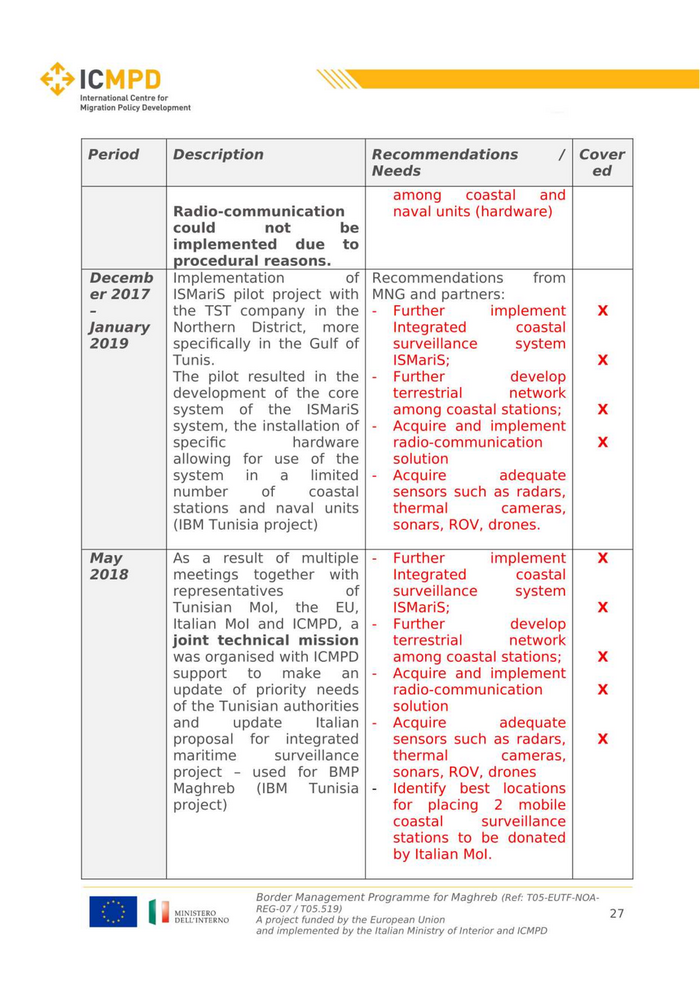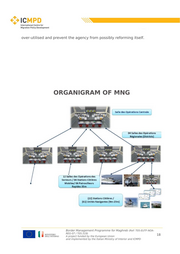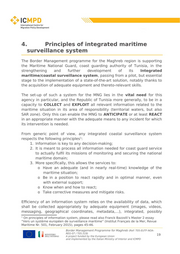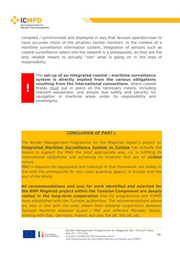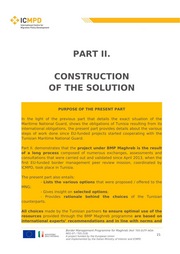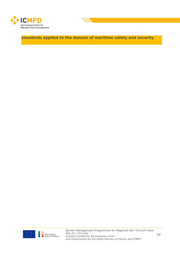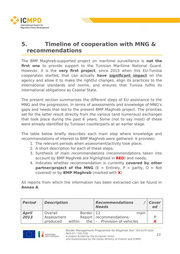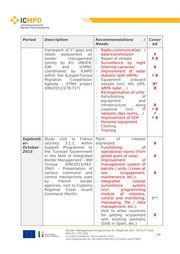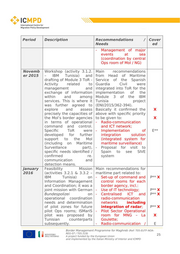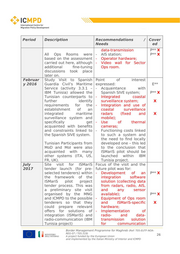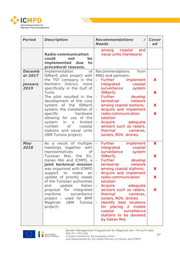Dossier_Integrated_Coastal_Surveillance_System_MNG_Tunisia_Nov_2019
&>ICMPD
International Centre for
Migration Policy Development
over-utilised and prevent the agency from possibly reforming itself.
ORGANIGRAM OF MNG
!
12 Salles des Operations des
18
Border Management Programme for Maghreb (Ref: T05-EUTF-NOA-
REG-07 / T05.519)
A project funded by the European Union
and implemented by the Italian Ministry of Interior and ICMPD
i MINISTERO
DELL’INTERNO
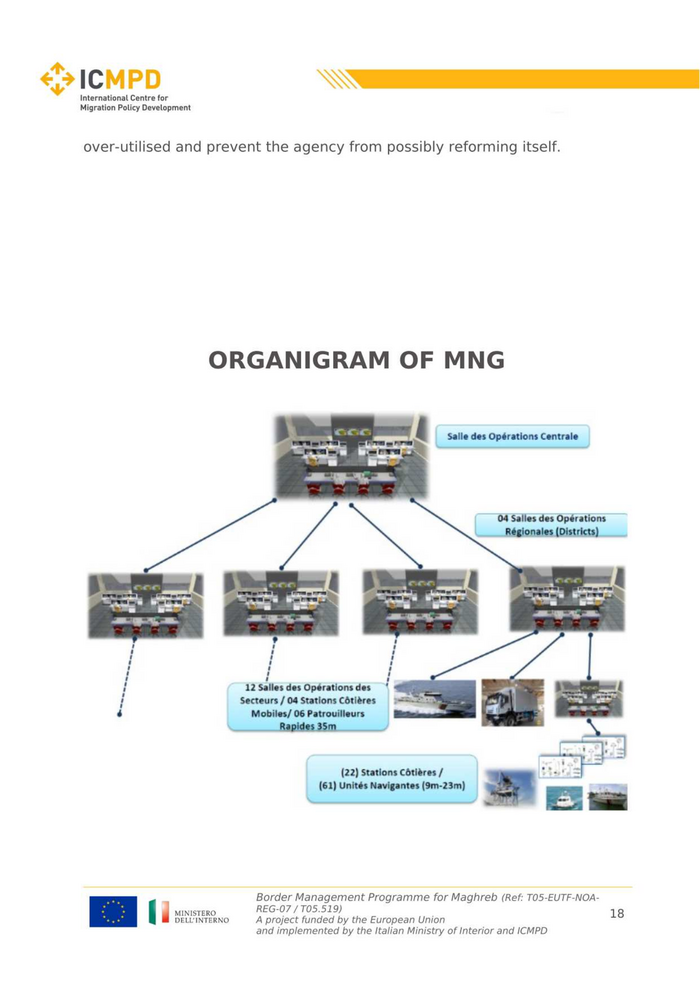
&>ICMPD N International Centre for Migration Policy Development 4. Principles of integrated maritime surveillance system The Border Management programme for the Maghreb region is supporting the Maritime National Guard, coast guarding authority of Tunisia, in the strengthening and further development of its Integrated maritime/coastal surveillance system, passing from a pilot, but essential stage to the implementation of a state-of-the-art solution, notably thanks to the acquisition of adequate equipment and thereto-relevant skills. The set-up of such a system for the MNG lies in the vital need for this agency in particular, and the Republic of Tunisia more generally, to be in a capacity to COLLECT and EXPLOIT all relevant information related to the maritime situation in its area of responsibility (territorial waters, but also SAR zone). Only this can enable the MNG to ANTICIPATE or at least REACT in an appropriate manner with the adequate means to any incident for which its intervention is needed. From generic point of view, any integrated coastal surveillance system respects the following principles!: 1. Information is key to any decision-making; 2. It is meant to process all information needed for coast guard service to actually fulfil its missions of monitoring and securing the national maritime domain; 3. More specifically, this allows the services to: o Have an adequate (and in nearly real-time) knowledge of the maritime situation; o Be in a position to react rapidly and in optimal manner, even with external support; o Know when and how to react; o Take corrective measures and mitigate risks. Efficiency of an information system relies on the availability of data, which shall be collected appropriately by adequate equipment (images, videos, messaging, geographical coordinates, metadata,...), integrated, possibly ! On principles of information system, please read also Franck Bazzolli’s Master 2 essay “Vers un systeme europeen de surveillance maritime” (Institut Francais de la Mer, Revue Maritime Nr. 501, February 2015), pages 45-46. Border Management Programme for Maghreb (Ref: T05-EUTF-NOA- REG-07 / T05.519) \ISTERO 3] h i DELLINTERNO A project funded by the European Union 19 and implemented by the Italian Ministry of Interior and ICMPD
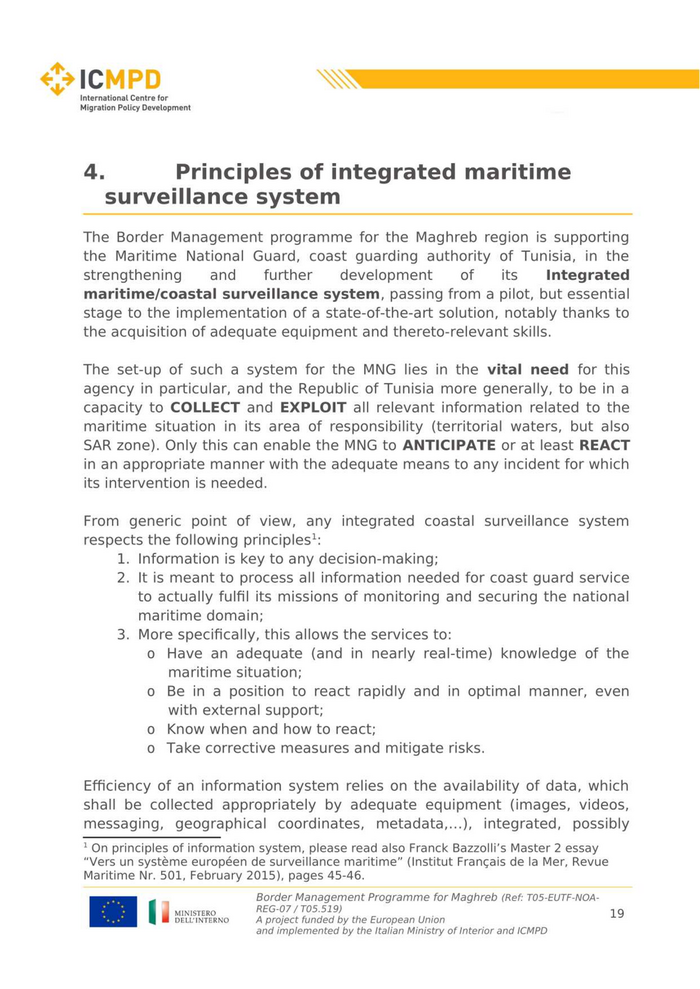
IC International Centre for Migration Policy Development compiled / synchronised and displayed in way that favours operator/user to have accurate vision of the situation he/she monitors. In the context of a maritime surveillance information system, integration of sensors such as coastal surveillance radars into the network is a prerequisite, as they are the only reliable means to actually “see” what is going on in the area of responsibility. The set-up of an integrated coastal / maritime surveillance system is directly implied from the various obligations resulting from the international conventions, where coastal States must put in place all the necessary means, including relevant equipment, and ensure due safety and security for navigation in maritime areas under its responsibility and sovereignty. CONCLUSION OF PARTI. The Border Management Programme for the Maghreb region’s project on Integrated Maritime Surveillance System in Tunisia has actually the means to support the MNG the most appropriate way, i.e. in fulfilling its international obligations and achieving its missions that are of civilian nature. MNG’s requests for equipment and trainings in that framework are totally in line with the prerequisite for any coast guarding agency in Europe and the rest ofthe World. All recommendations and axis for work identified and selected for the BMP Maghreb project within the Tunisian Component are deeply rooted in the long-term cooperation that EU programmes and ICMPD have established with the Tunisian authorities. The recommendations above are also in line with the ones drawn from bilateral cooperation between Tunisian Maritime National Guard / Mol and different Member States, starting with Italy, Germany, France, but also the UK, the US, etc. ö Border Management Programme for Maghreb (Ref: T05-EUTF-NOA- ; REG-07 / T05.519) \ISTERO 3] ( e DELLINTERNO A project funded by the European Union 20 and implemented by the Italian Ministry of Interior and ICMPD
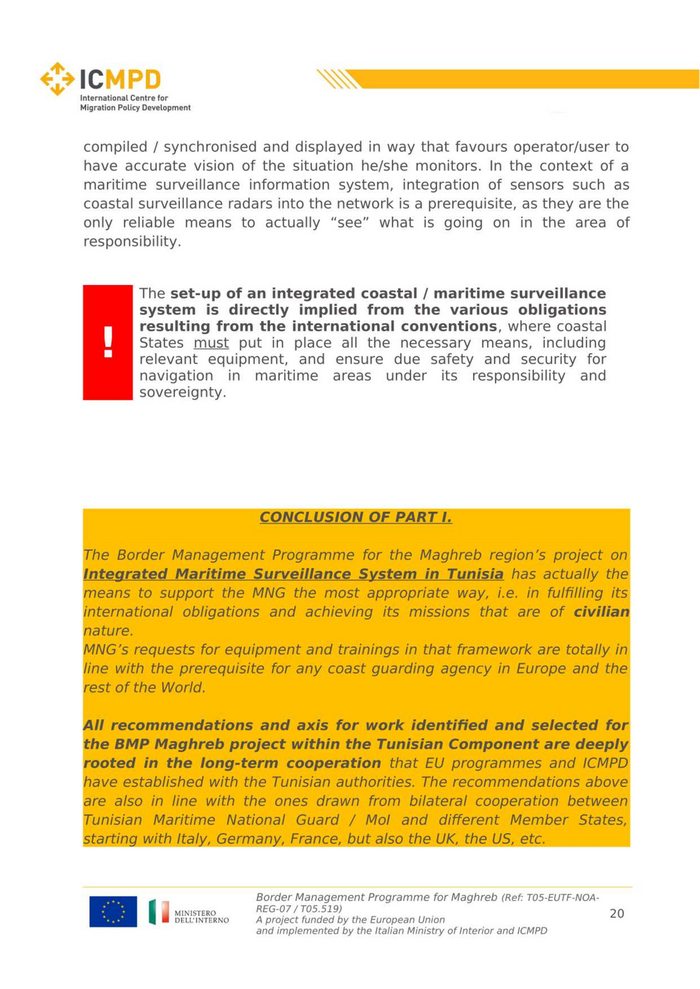
IC International Centre for Migration Policy Development PART II. CONSTRUCTION OF THE SOLUTION PURPOSE OF THE PRESENT PART In the light of the previous part that details the exact situation of the Maritime National Guard, shows the obligations of Tunisia resulting from its international obligations, the present part provides details about the various steps of work done since EU-funded projects started cooperating with the Tunisian Maritime National Guard. Part Il. demonstrates that the project under BMP Maghreb is the result of a long process composed of numerous exchanges, assessments and consultations that were carried out and validated since April 2013, when the first EU-funded border management peer review mission, coordinated by ICMPD, took place in Tunisia. The present part also entails: - Lists the various options that were proposed / offered to the MNG; - Gives insight on selected options; - Provides rationale behind the choices of the Tunisian counterparts. All choices made by the Tunisian partners to ensure optimal use of the resources provided through the BMP Maghreb programme are based on international experts’ recommendations and in line with norms and A project funded by the European Union Border Management Programme for Maghreb (Ref: T05-EUTF-NOA- 3] h engasn REG-07 / T05.519) 21 MM DELL'INTERNO and implemented by the Italian Ministry of Interior and ICMPD
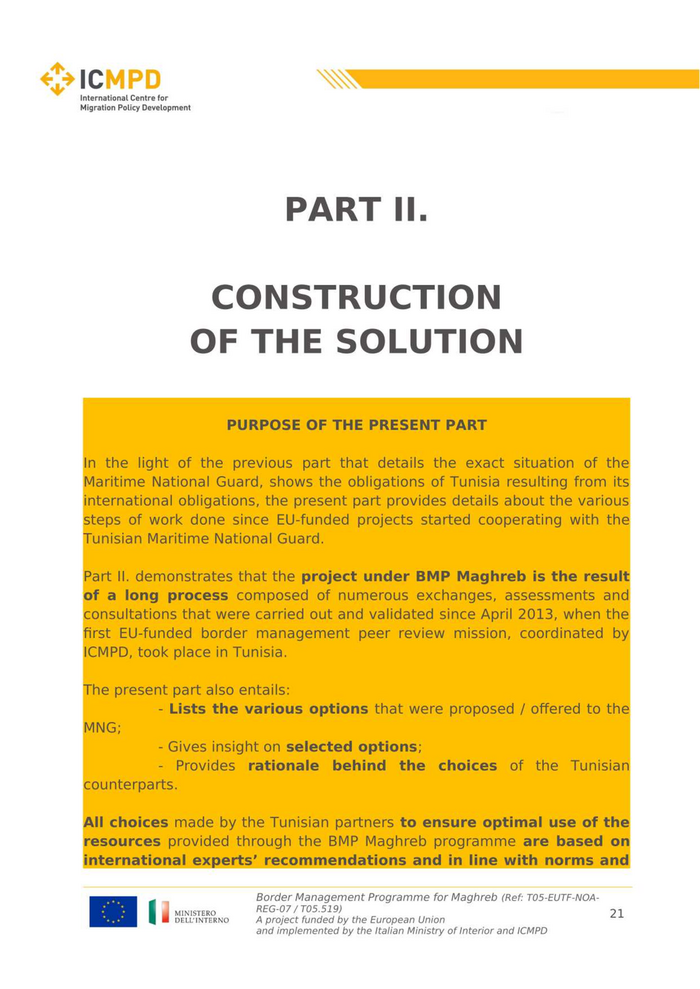
&>ICMPD \ CH International Centre for Migration Policy Development Border Management Programme for Maghreb (Ref: T0O5-EUTF-NOA- REG-07 / T05.519) 3] h i DELL’INTERNO A project funded by the European Union 22 and implemented by the Italian Ministry of Interior and ICMPD
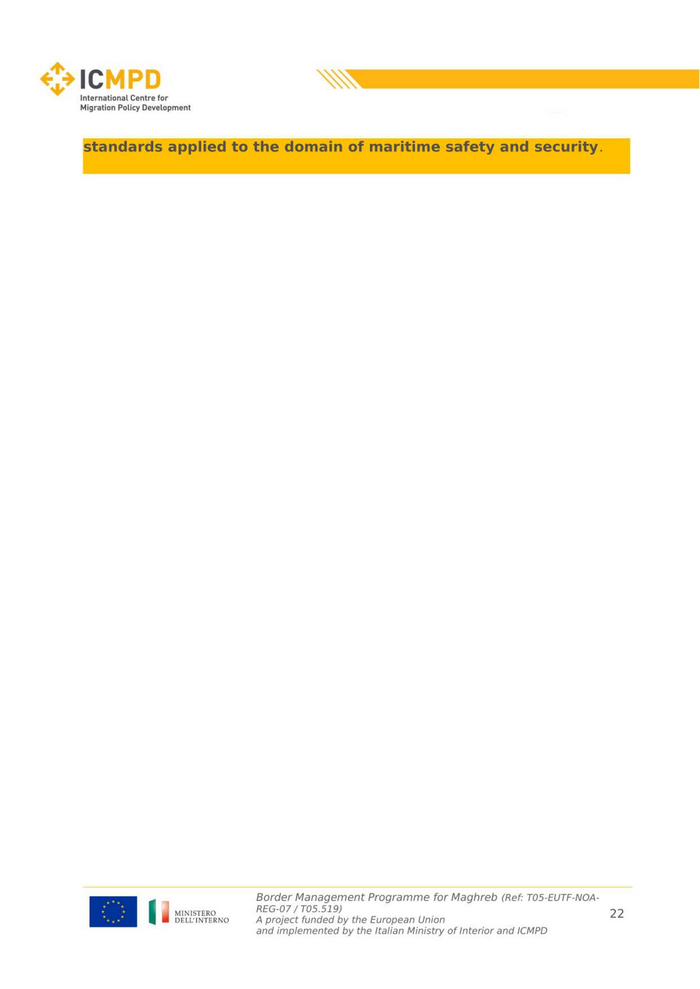
&>ICMPD N International Centre for Migration Policy Development 5: Timeline of cooperation with MNG & recommendations The BMP Maghreb-supported project on maritime surveillance is not the first one to provide support to the Tunisian Maritime National Guard. However, it is the very first project, since 2013 when this EU-Tunisia cooperation started, that can actually have significant impact on the agency and allow it to make the rightful changes, align its practices to the international standards and norms, and ensures that Tunisia fulfils its international obligations as Coastal State. The present section summarises the different steps of EU assistance to the MNG and the progression, in terms of assessments and knowledge of MNG'’s gaps and needs that led to the present BMP Maghreb project. The priorities set for the latter result directly from the various (and numerous) exchanges that took place during the past 6 years. Some (not to say most) of these were already identified by Tunisian counterparts at an earlier stage. The table below briefly describes each main step where knowledge and recommendations of interest to BMP Maghreb were gathered. It provides: 1. The relevant periods when assessment/activity took place; 2. A short description for each of these steps; 3. Synthesis of main recommendations (recommendations taken into account by BMP Maghreb are highlighted in RED) and needs; 4. Indicates whether recommendation is currently covered by other partner/project of the MNG (E = Entirely, P = partly, O = Not covered) or by BMP Maghreb (marked with X) All reports from which the information has been extracted can be found in Annex A. Period Description Recommendations / | Cover Needs ed April Overall Border | 12 main 2013 Assessment Report | recommendations: produced within the |- Provision of vehicles E33 ( j Border Management Programme for Maghreb (Ref: T05-EUTF-NOA- ; REG-07 / T05.519) \ISTERO DELLINTERNO A project funded by the European Union 23 and implemented by the Italian Ministry of Interior and ICMPD
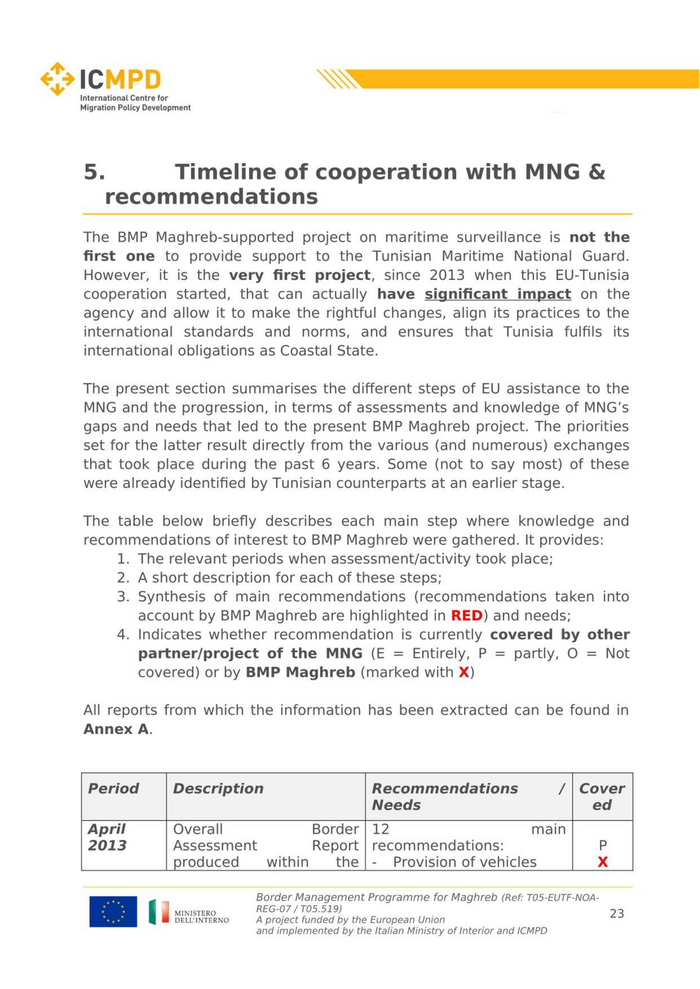
&>ICMPD International Centre for I Migration Policy Development Septemb er- October 2015 Description framework of 1°‘ gaps and needs assessment on border management (jointly by EU, UNHCR, IOM and ICMPD, coordinated by ICMPD within the Europe-Tunisia Migration Cooperation Agenda - ETMA project (ENI/2011/279-717) Study visit to France (activity 3.1.1, within Support Programme to the Tunisian Government in the field of Integrated Border Management - IBM Tunisia (ENI/2015/362- 394)) - Presentation of various command and control mechanisms used by French border agencies, visit to Customs Regional Coast Guard Command (North). Recommendations / Needs Point Radio-communication / data-transmission Repair of vessels Surveillance by night (thermal cameras) Improvement of radar stations (with ARPA) Equipment onboard vessels (incl. AIS, GPS, ARPA radar....) Re-organisation of units Refurbishing of equipment and infrastructure along coastline (incl. IT network, Ops rooms,...) Improvement of SOP Personal equipment Clothing Training of interest expressed: Functioning of operational rooms (from global point of view) Improvement of management system of patrols / units / crews at sea (engagement, maintenance, etc.); Integrated coastal surveillance system (incl. programming module of missions, control and monitoring, messaging, file / data management, etc.); Visit to other countries for getting acquainted with existing solutions (SIVE in Spain, etc.) Cover ed Border Management Programme for Maghreb (Ref: T05-EUTF-NOA- MINISTERO REG-07 / T05.519) DELL’INTERNO A project funded by the European Union and implemented by the Italian Ministry of Interior and ICMPD 24
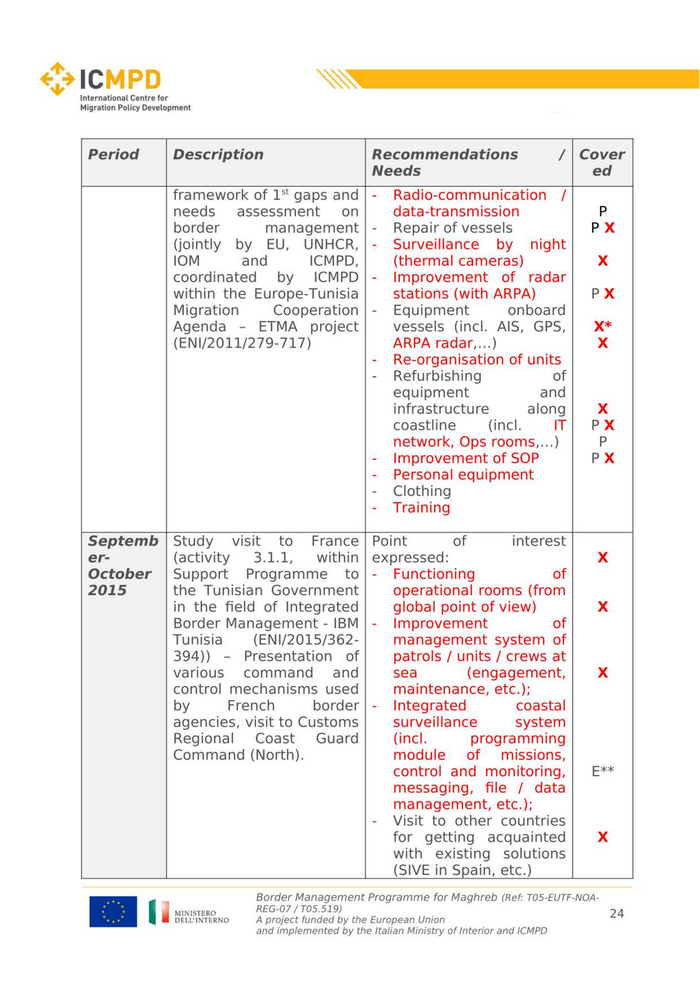
€ 2>ICMPD International Centre for I Migration Policy Development Period Description Recommendations / | Cover Needs ed Novemb er 2015 January 2016 Workshop (activity 3.1.2. - IBM Tunisia) and drafting of Module 3 ToR - Activity related to management and exchange of information within and among services. This is where it was further agreed to explore and assess precisely the capacities of the Mol’s border agencies in terms of operational command and control. ToR were further the Mol Specific developed for support to (including on Maritime Surveillance part), specific needs identified / confirmed re. communication and detection means. Feasibility Mission (activities 3.2.1 & 3.3.2 - IBM Tunisia) on Information Management and Coordination; it was a joint mission with German Bundespolizei on operational coordination needs and determination of pilot zones for future pilot Ops rooms; ISMariS pilot was proposed by Tunisian counterparts subsequently. Border Management Programme for Maghreb (Ref: T05-EUTF-NOA- MINISTERO REG-07 / T05.519) DELL’INTERNO - EEE: au major events sea ie br central Ops room of Mol / NG) Main recommendations from Head of Maritime Service of the Spanish Guardia Civil were integrated into ToR for the implementation of the Module 3 of the IBM Tunisia project (ENI/2015/362-394). Basically it confirmed the above with specific priority to be given to: - Radio-communication and ICT network; Implementation of integration solution (integrated system for maritime surveillance) Proposal for visit to Spain to see SIVE system Main recommendations for maritime part related to: - Set-up of command and control rooms for each border agency, incl.: Use of IT technology; Centralised ICT and radio-communication networks including integration of radar; Pilot Sector Operational room for MNG - La Goulette; Radio-communication / A project funded by the European Union and implemented by the Italian Ministry of Interior and ICMPD 25
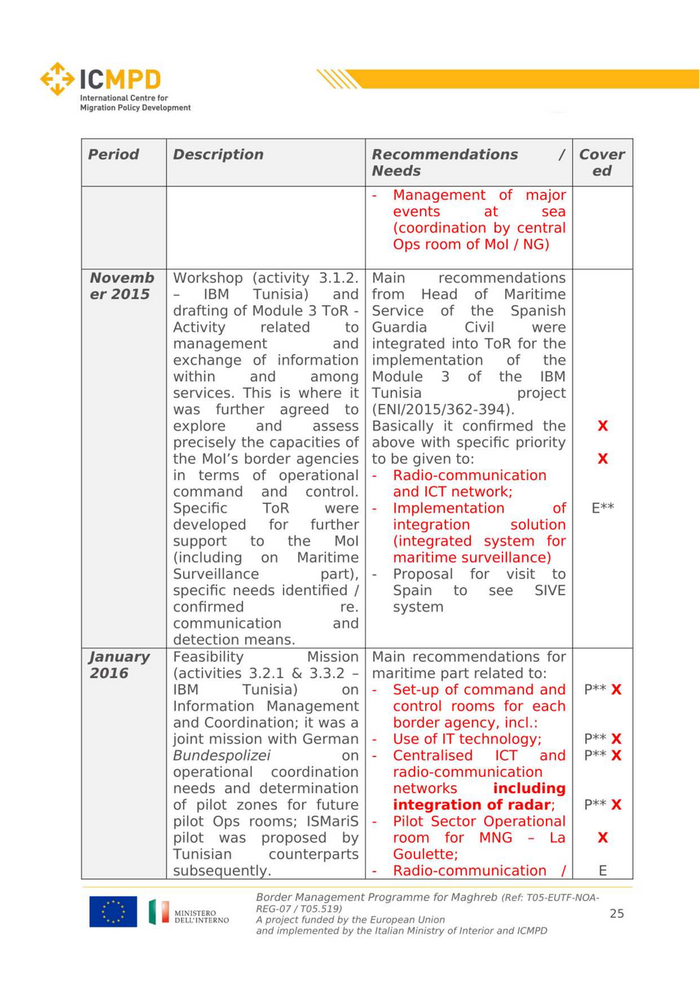
€ 2>ICMPD International Centre for I Migration Policy Development zu Description Recommendations / | Cover Needs ed Februar y 2016 Al Ops Rooms were based on the assessment carried out here, although fine-tuning took place additional discussions later on. Study Visit to Spanish Guardia Civil’s Maritime Service (activity 3.3.1 - IBM Tunisia) allowed the Tunisian counterparts to further identify requirements for the establishment of an integrated maritime surveillance system and specifically get acquainted with benefits and constraints linked to the Spanish SIVE system. Tunisian Participants from MoD and Mol were also acquainted with many other systems (ITA, US, FR, UK). Site visit for 1ISMariS tender launch (for pre- selected tenderers) within the framework of the ISMariS pilot project tender process. This was a preliminary site visit organised by the MNG and ICMPD to the possible tenderers so that they could prepare relevant offers for solutions of integration (ISMariS) and radio-communication (IBM Tunisia project) data-transmission AIS station; Operator hardware; Video wall for Sector Ops room. Point of interest expressed: - Acquaintance with Spanish SIVE system; Integrated coastal surveillance system; Integration and use of coastal surveillance radars (fixed and mobile); Use cameras; Functioning costs linked to such a system and the need to find locally developed one - this led to the conclusion that ISMariS pilot should be launched within IBM Tunisia project. Focus of the visit and the future pilot was for: - Development of an integration software solution (collecting data from radars, radio, AIS, and any sensor available); Equipment of Ops room and ISMariS-specific hardware; Implementation radio- and data- transmission solution for communication of thermal of Border Management Programme for Maghreb (Ref: T05-EUTF-NOA- REG-07 / T05.519) A project funded by the European Union and implemented by the Italian Ministry of Interior and ICMPD MINISTERO DELL’INTERNO 26
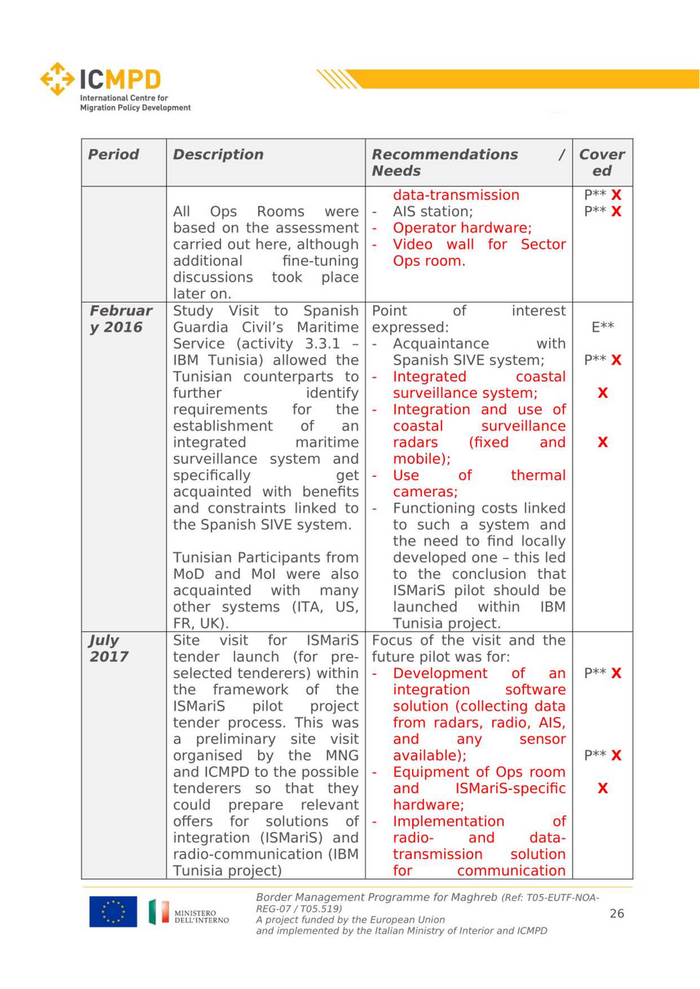
&>ICMPD International Centre for I Migration Policy Development Period Description Recommendations / | Cover Needs ed Decemb er 2017 January 2019 Radio-communication could not be implemented due to procedural reasons. Implementation of ISMariS pilot project with the TST company in the Northern District, more specifically in the Gulf of Tunis. The pilot resulted in the development of the core system of the ISMariS system, the installation of specific hardware allowing for use of the system in a limited number of coastal stations and naval units (IBM Tunisia project) As a result of multiple meetings together with representatives of Tunisian Mol, the EU, Italian Mol and ICMPD, a joint technical mission was organised with ICMPD support to make an update of priority needs of the Tunisian authorities and update Italian proposal for integrated maritime surveillance project - used for BMP Maghreb (IBM Tunisia project) among coastal and naval units (hardware) Recommendations from MNG and partners: - Further implement Integrated coastal surveillance system ISMariS; Further develop terrestrial network among coastal stations; Acquire and implement radio-communication solution Acquire adequate sensors such as radars, thermal cameras, sonars, ROV, drones. Further Integrated surveillance ISMariS; Further develop terrestrial network among coastal stations; Acquire and implement radio-communication solution Acquire adequate sensors such as radars, thermal cameras, sonars, ROV, drones Identify best locations for placing 2 mobile coastal surveillance stations to be donated by Italian Mol. implement coastal system Border Management Programme for Maghreb (Ref: T05-EUTF-NOA- REG-07 / T05.519) 27 A project funded by the European Union and implemented by the Italian Ministry of Interior and ICMPD j MINISTERO DELL’INTERNO
